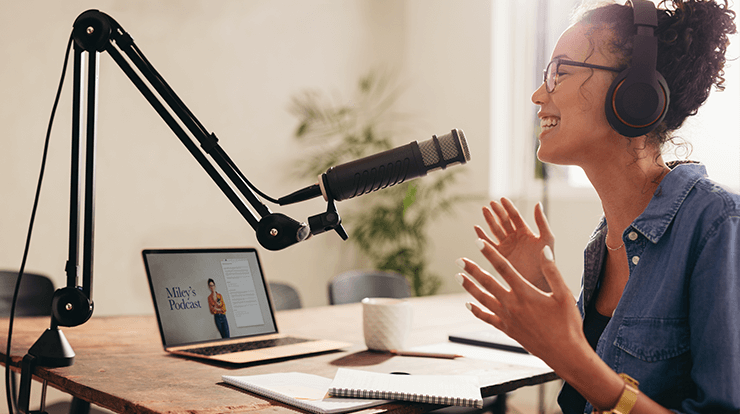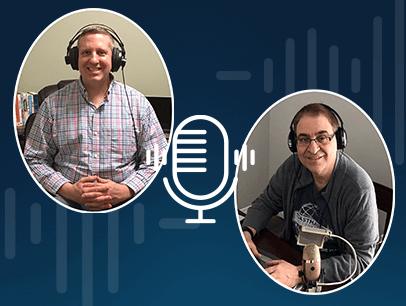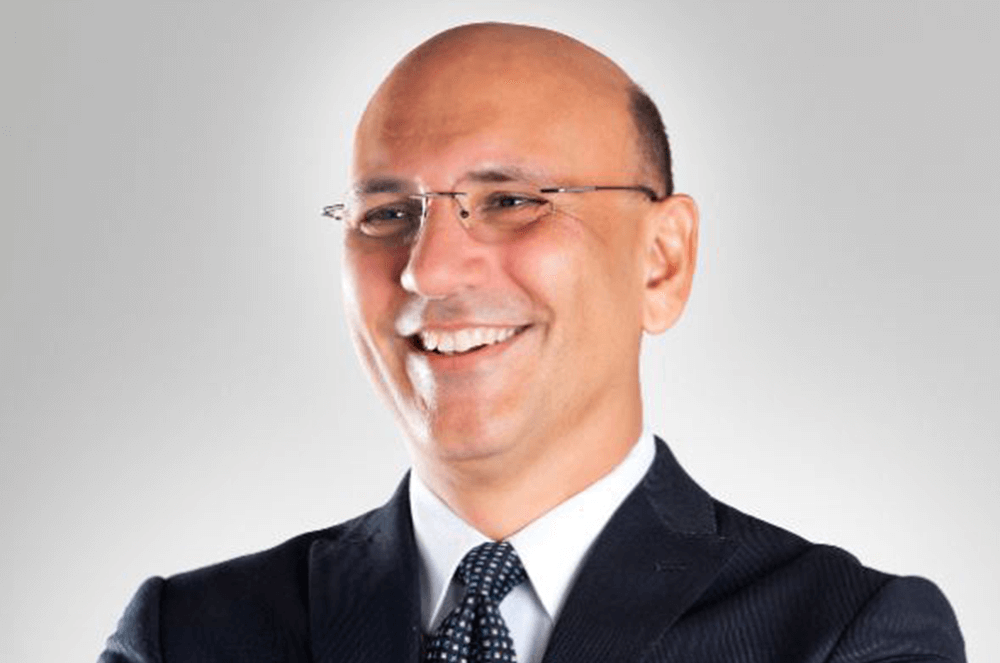If you’ve ever had a “driveway moment,” where you stayed in your car after arriving home just to hear the end of a podcast, or gone down the rabbit hole of listening to podcasts about one of your passions, you’ve experienced the magic of audio content. A podcast can forge a powerful, intimate connection between the host and listener. It can turn a chore like folding laundry into a cherished activity.
About 10 years after I first listened to a podcast, I started my own. I’ve been a podcaster for nearly eight years now and produced over 400 episodes of my show, What Works. I’ve also become a producer for 15 other shows on topics ranging from entrepreneurship to social justice to homeschooling. Podcasting has made me a better speaker, a more attuned listener, and a more effective communicator. Plus, it’s taught me the value of consistency and practice.
Through my podcasting practice, I’ve learned to embrace a sustainable pace, experiment with new ideas, and find satisfaction in incremental progress. And as a result, I’ve connected with my audience in meaningful ways. I’ll share how you can do the same.
In this Toastmasters Podcast episode, writer, podcaster, and producer Tara McMullin shares her passion for podcasting and encourages listeners to put their podcast in practice.
The “Practice” of Podcasting
A practice is a tool for cultivating presence, well-being, and perspective. I have a podcasting practice the way I have a yoga practice and a writing practice.
Practice gives us an anchor in today’s chaotic and uncertain world. It can feel like we’re at the mercy of ever-changing project plans, algorithms, and business priorities. Urgency is often in the driver’s seat. Practice gives us something to rely on, and, in turn, we learn to rely on ourselves.
Podcasting has made me a better speaker, a more attuned listener, and a more effective communicator.
Podcasting is a practice because it’s process-driven and constantly available to you. There is always something that needs tending, whether it’s a script, an edit, or an editorial plan. And it’s best not to put those things off until they must be done but to choose to show up regularly to the proverbial mic instead.
There was a time when the idea of practice was anathema to me. If I couldn’t do it up to my expectations the first or second time, well, I just wasn’t going to do it. I wasn’t interested in skill-building or maintenance. I didn’t want to run drills or do conditioning—just put me in the game, coach.
Podcasting changed that for me and helped me find satisfaction in practice and consistency. It introduced me to the pleasure of doing the same thing over and over again—and discovering something new every time.
How to Start Your Own Podcast
Starting a podcast can be intimidating. But it doesn’t have to be. Most people think the challenge of podcasting is technical—recording, editing, uploading, etc. But the real hurdle for many is embracing a consistent creative process. “I’m convinced most barriers to creativity become non-issues when you have a personal practice,” says Jay Acunzo, a speaker and the host of Unthinkable.
So how do you jumpstart your personal practice? Start with a solid foundation.
In this two-part series of The Toastmasters Podcast, the hosts share advice on how to find interesting content for your podcasts.
The first step is to develop a clear podcast premise.
Your premise is the subject matter of your show, plus your unique angle. For my podcast, What Works, the subject matter is work in the 21st-century economy. The angle I explore is human well-being. I cover a wide variety of topics—economics, philosophy, and culture, to name a few—but each topic is related to work and how we can maintain our well-being despite systemic obstacles.
When you have a strong podcast premise, you can explore topics outside your usual purview while maintaining a strong point of view. “I love podcasting because it helps me refine my points of view or messaging, and really work out the most valuable aspects of the topic before I bring it to the stage with more laser focus,” says Katy Widrick, host of Rising Tide Talents Show.
“[Podcasting has] given me a chance to nurture my own voice.”
—Tania BhattacharyyaThe next step is editorial planning.
While your podcast premise gives an overarching theme to your soon-to-be body of work, your editorial plan lays out specific topics you’ll cover in future episodes. Even if you plan to host an interview podcast, planning topics first means you’ll prioritize your message and perspective over flashy names or guest pitches.
On What Works, I plan most of my content in a series of four to eight episodes. A series has a broader topic (e.g., “Self-Help, LLC,” “Time and Money,” and “The Economics of …”), and then each episode tackles a different question I have about that topic. In my recent series, “The Economics of …,” I asked, “What makes information valuable?” to frame an episode. Every episode I produce is based on a question that intrigues me, a story I find gripping, or an idea that I want to explore.
Once you have a premise and an editorial plan, it’s time to develop your voice.
I ask new podcasters to think about the kind of relationship they want to have with listeners: mentor, teacher, expert, savvy friend, curator, interlocutor, etc. Each role has a slightly different tone and will lead to small differences in how you might approach a topic. This decision—like any decision about your podcast—is not set in stone. My own voice has shifted over the years from consultant to curator to expert to journalist.
As your podcasting practice develops, you’ll learn to “show up more fully in all the spaces” you’re in, says Tania Bhattacharyya, host of the Campfire Circle podcast. “[Podcasting has] given me a chance to nurture my own voice,” she adds.

Forging a Sustainable Pace
The first thing new podcasters discover is that podcasting is a marathon, not a sprint. While many of us have learned to ping-pong from one task or project to the next—letting speed and efficiency run the show—podcasting requires consistent attention over the long haul.
At any given time, I might be working on three to eight episodes in different stages of the production process. Even as I write this, I’ve just wrapped up a research-intensive eight-part series, and plan to take the next few months to prepare, report, and write another series to air later this year. I’m not releasing new episodes regularly right now, but I’m still immersed in the practice of podcasting. I’m pacing myself.
Podcasting has taught me the value of moving a bit slower than my default speed so I can focus on quality and longevity. The intention is to do just enough that I’m proud of what I’m doing—and can do it again next week and the week after that, and the week after that.
Experimenting Creatively
When I first started podcasting, my show was extremely simple. There was a canned intro, pre-recorded guest bio, the interview, and the credits. I put all my effort into making the interview engaging and unique. And the show was good! Over time, it didn’t take so much brainpower to make the interviews distinctive—so I could give more thought to other aspects of the show.
I fine-tuned the premise of the podcast and developed new episode structures. I leaned on narrative and argumentation techniques to hone my episode intros. And most recently, I shifted the format of the show from straight interviews to a highly edited narrative style.
It took me more than five years of podcasting practice to take the leap into the creative territory I once only dreamed about. If I’d set the bar for my show where it is for episode 400 when I was just working on episode 1, I would have never started. I’m the podcaster I am today because I made those first 400 episodes. I fumbled some interview questions and absolutely nailed others. I backed down from some sticky subjects and tackled others head-on. I’ve lost focus and regained it. I’ve gotten way behind and way ahead.
But year after year, episode after episode, I experimented with incremental changes that add up to something my listeners routinely tell me is special and singular. With any practice, putting in time and effort will help you improve. With every podcast you produce, you will learn something new and discover a skill you can enhance or gain a better understanding of.
Any form of communication or creativity requires a practice. Not as in “practice makes perfect,” but practice as in presence and care. Without these, we won’t be as effective as we can be. And we’ll deny ourselves the benefits of sustainable pacing, creative experimentation, and satisfying work.
Whether you’re already a seasoned podcaster, an aspiring podcaster, or a human who creates or communicates in any way, embracing the practice of that work can open some incredible doors—now and in the future.
Tara McMullin is the host of What Works, a podcast that explores how to navigate the 21st century without losing your humanity, and the author of What Works: A Comprehensive Framework for Changing the Way We Approach Goal-Setting.
Related Articles

Podcasts
Is There a Podcast in Your Future?

Podcasts
Tune In to The Toastmasters Podcast

Your Turn



 Previous
Previous

 Previous Article
Previous Article